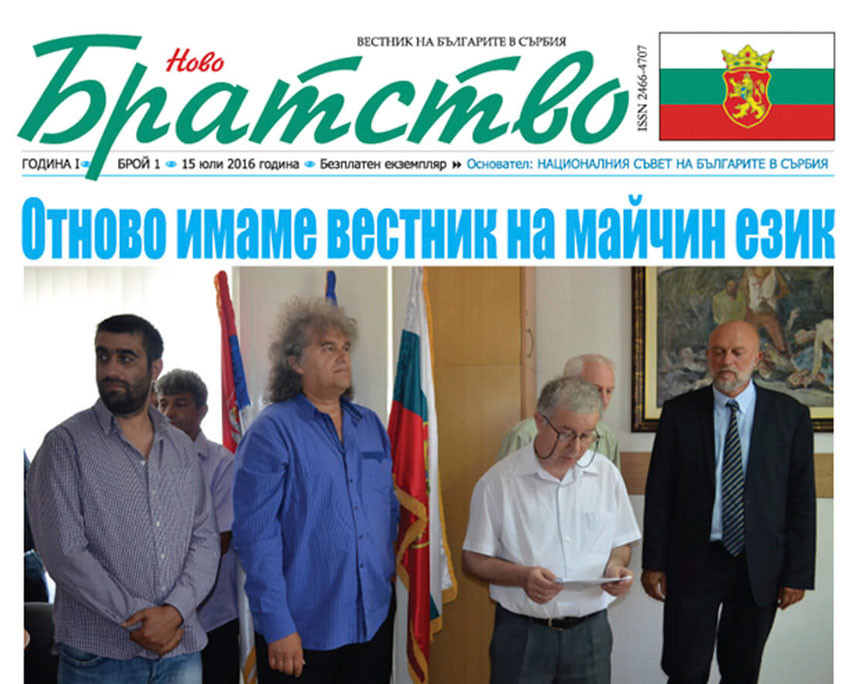Data from the Statistical Institute of Serbia from 2011 shows that a little over 18,000 people have identified themselves as Bulgarians in that country. The largest Bulgarian minority in Serbia is found in the eastern parts of Bulgaria’s western neighbour - mainly the municipalities of Bosilegrad and Tsaribrod. In recent years, due to the increasing economic migration, Bulgarians there have become less and less numerous, says Mila Vasov, director of the Novo Bratstvo (New Brotherhood) publishing house and editor-in-chief of the eponymous newspaper published in Bulgarian in the town of Niš.
"The newspaper has existed since 1949, and until two years ago it came out as a supplement to the Pirotska Svoboda (Pirot Freedom) newspaper and for about a year - as an independent Bulgarian newspaper entitled “Svoboda” (Freedom), i.e. we have existed since 1949 to the present day. There was an interruption in its publishing between 2012 and 2016. Initially, the newspaper was a weekly, and now, due to lack of funds, it is published every two weeks. One part of it is dedicated to life in the municipalities of Tsaribrod and Bosilegrad, and the other one to culture. We present the body of creative work of Bulgarians in Serbia. From 1960 to 2012 also the children's magazine "Drugarche" (Little Friend) was published, and from 1964 to 2012 - a large literary publication. Over the years, we have had a wealth of publishing activities funded by former Yugoslavia. During this time more than 150 books were printed in Bulgarian. Now we have the newspaper only."

Mila Vasov believes that the main role of the Bulgarian media in Serbia should be to unite all Bulgarians living there.
"The main characteristic of the Bulgarian minority here is that it is divided. We do not act as one organism. All the media call on us to work together in co-operation, but in practice we are divided. Why is that? There are a number of reasons…"
The region with Bulgarian population in neighbouring Serbia are defined in Bulgaria as "the western outlands" - a term established after the First World War and referring to the territories detached from the Bulgarian state and annexed to the Kingdom of Serbs, Croats and Slovenes under the Neuilly Peace Treaty signed on November 27, 1919. Most of these territories fall in Serbia and another part in present-day North Macedonia.
"In fact, about 18,000 Bulgarians live in Serbia. Currently, the education process in part of the primary schools in the western outlands is conducted in Bulgarian, in other places it is mixed. During socialism the education was entirely in Bulgarian, later children had the right to choose which language to study. However, after graduating, most of them continue their education in Sofia."
English Rossitsa Petcova
Photos: novo.bratstvo.rsAt the Bulgarian Embassy in London, Prof. Bettany Hughes presented excerpts from the new BBC series - Wonders of Bulgaria. Prof. Bettany Hughes is the author of two episodes of the documentary. Hughes is a historian, writer, author of..
According to the Annual Report on the Health Status of Bulgarian Citizens for 2023, t he main cause of death in Bulgaria is diseases of the cardiovascular system (61.1%), followed by oncological diseases (16.5%) and diseases of the respiratory system..
In the week of St. Andrew’s Day (also known as Bears’ Day or Mechkinden), WWF is drawing attention to six orphaned bear cubs who have been given a second chance at life. The initiative is part of the "Subscribe to Nature" campaign and..
Modernizing critical thinking skills, fact-checking skills and media literacy are essential for society, especially for young people in Bulgaria - the..
The survival of millions of people around the world, living in conditions of war, hunger, disease and immense despair, is at stake every day. We often..
"You say you are Bulgarian, but you do not know Bulgarian" – this reproach from officials in Bulgaria has been faced by quite a few by our compatriots..

+359 2 9336 661
